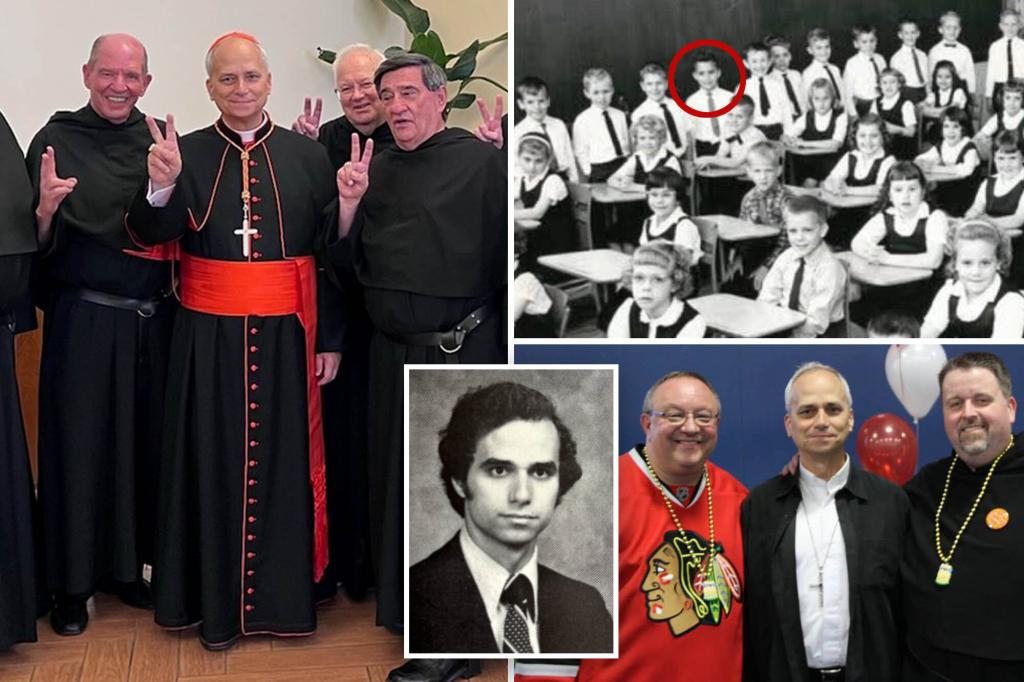Cardinal Robert Prevost, a Chicago native who spent his career ministering in Peru, has been elected the new Pope, becoming the first American to be named pontiff in the Catholic Church’s 2,000-year history.
The 69-year-old will become Leo XIV as he succeeds the late Pope Francis, who brought the Peruvian-American to the Vatican back in 2023 to head the office of bishops.
The globe-trotting Prevost has spent years leading the faithful in Chicago, Peru and Italy, with the American now in charge of overseeing the church’s flock of more than 1.4 billion people.
Check here for live updates on Pope Leo XIV, the newly chosen pontiff
Where is he from?
Prevost was born in Chicago on Sept. 14, 1955, to Louis Marius Prevost and Mildred Martinez.
He grew up on Chicago’s South Side, attending St. Mary of the Assumption Church on E. 137th Street.
He has both US and Peruvian citizenship, the latter of which likely helped Prevost’s rise to pontiff as the Vatican tends to overlook citizens of global superpowers for the role of pope.
Follow the latest on the election of Pope Leo XIV:
What to know about his upbringing?
Prevost served as an altar boy and attended a parish school and minor seminary school.
Along with knowing English and Spanish, Prevost was taught French by his father, and Italian by his mother.
He earned a Bachelors of Science degree in mathematics at Villanova University in Pennsylvania and soon after sought to become a priest, joining the Order of St. Augustine in 1977.
What to know about his family
Prevosts’ father, Louis, was the superintendent of the south suburban schools in District 169 and had served as a Navy lieutenant in the Mediterranean during World War II. Louis died in 1997.
His mother, Mildred, was a librarian and devout Catholic who sang in the choir at St. Mary’s. She died in 1990.
Prevost has two brothers, John Joseph Prevost and Louis Martin Prevost.
Robert Prevost’s journey to becoming pope
After getting his ordination, Prevost rose up the ranks of the Augustine order and joined missions in Peru in 1985 and 1988, with the latter resulting in a 10-year stay heading a seminary in Trujillo.
After the stint in Peru, Prevost returned to America when he was elected to head the Augustinian Province of Chicago, with the priest twice elected the order’s top leader.
Francis had tracked Prevot’s career for years, tapping him as the administrator of the Diocese of Chiclayo in 2014 to oversee Peru’s poorest enclave.
He was named bishop there the following year.
By 2023, Francis tapped Prevost to oversee the Dicastery for Bishops, a powerful office that selects bishops around the world.
In early 2025, Francis gave Prevost the most senior rank of cardinals, making the American the unofficial favorite to succeed the pope.
What to know about his political views?
As a close ally of Francis, Prevost presided over some of the late pope’s most revolutionary reforms.
Prevost saw three women added to the voting bloc that decides which bishop nominations to forward to the pope, a first in the church’s history.
He also supported Francis’ views on fighting climate change and making the church more inclusive.
Prevost has notably spent years criticizing President Trump’s stance on illegal immigration, saying it went against the church’s teaching and the promise of the American Dream.
Prevost previously found himself in hot water in 2000 when he faced allegations that he mishandled or failed to act on sexual abuse cases involving priests in both the US and Peru.
What to know about his religious beliefs?
Prevost has been a devoted Catholic his entire life, and spoke about the need to be close to God when arriving at the Vatican in 2023.
“Pope Francis has spoken of four types of closeness: closeness to God, to brother bishops, to priests and to all God’s people,” he told the Vatican News. “One must not give in to the temptation to live isolated, separated in a palace, satisfied with a certain social level or a certain level within the church.”
“And we must not hide behind an idea of authority that no longer makes sense today,” he continued. “The authority we have is to serve, to accompany priests, to be pastors and teachers.”


